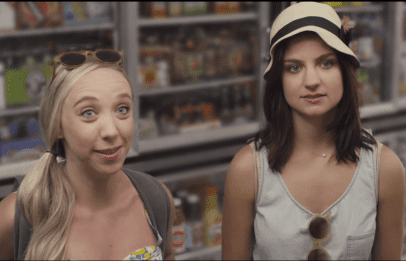I recently worked with a woman who calls herself a feminist. Now I’ve got nothing against feminists (I know . . . famous last words). In fact I consider myself to be as much of a feminist as any man could be. Anyway, I was talking to her about a newly released movie that I absolutely adore — Fort Tilden.
You really have to see this film. It’s very funny. Fort Tilden is a critique of the younger generation, and as I’m incorrigibly old, I can’t help but love that kind of thing. Anyway, the film follows two young women in their mid-20s on their way to meet boys at Rockaway Beach. These gals are amazing — selfish, narcissistic, sexually voracious, cruel and stupid. They commit many crimes blithely, but most memorably, they almost run over a child on their bikes and drown a nest of kittens without even batting an eye. (“Oh excuse me, sorry I was . . . um — texting?!”)
When I told my new feminist acquaintance that I loved the film, I said, “I suppose the film might be considered sexist. But as a gay man, I just identify with those girls, ’cause I kinda am one.”
This drew a blank.
“I don’t get it,” she said.
“Well I’m just saying that I don’t identify as a man. I identify as a boy or a girl, but not as a man. So I really felt for these women like some gay men do. And so even though the film might be perceived as dismissive of women, I kinda am a girl — even though I know I’m really not — so I don’t think I was watching it through a sexist lens.”
Again, that went over like a lead balloon.
After heavy questioning, I figured out she was a feminist essentialist, meaning that she feels (much like cowboys in the Wild West used to feel) that “men are men and women are women” and never the twain shall meet. So — although I am an effeminate male and a drag queen — because I have a penis, I will always be just a good old fashioned, oppressive, sexist male.
People today have forgotten what it means to be gay or lesbian. Being trans means something. Being a woman means something. But being gay or lesbian means . . . what? As rising young filmmaker Chelsea McMullan said in The Globe and Mail, “It’s inevitable that diverse voices in age, race and gender be given more space.” Uh, excuse me, but why isn’t sexuality on those trendy diversity lists that straight, white people love throwing around?
It’s our fault, really. We gays and lesbians have been so excited about assimilation that the myth of “we’re all the same” has replaced the real truth: “we’re all fabulous but also fabulously different.”
Sure, gay marriage is here to stay, but that still doesn’t mean straights everywhere understand guys who bend over and take it up the ass.
It used to be that gay men’s special propensity for anal fun gave us a unique understanding of what it means to be differently gendered, and what it means to be promiscuous (never mind the gift of knowing what makes camp funny).
Nowadays, gay men like to pretend they don’t take it up the ass. (“Please,” sniff — “Sex is just not an important part of my life. Love is.”) And most gay men disavow any special knowledge of promiscuity or femininity.
So, even though homophobia is still there, we have no way to talk about the still unique and sometimes difficult experience of being gay.
So, obviously, there’s no way I can persuade the feminist who challenged me over Fort Tilden.
Sure, I can say anything I want to.
But these days — since since gays and lesbians are officially no longer a persecuted minority — she has absolutely no cause to believe me.

 Why you can trust Xtra
Why you can trust Xtra


